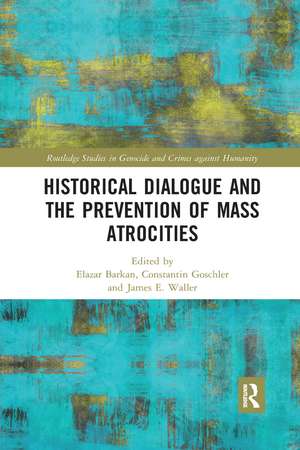Historical Dialogue and the Prevention of Mass Atrocities: Routledge Studies in Genocide and Crimes against Humanity
Editat de Elazar Barkan, Constantin Goschler, James Walleren Limba Engleză Paperback – 13 iun 2022
Established on a variety of international case studies combining theoretical and practical points of view, the book envisions an integrated understanding of how historical dialogue can inform policy, education, and the practice of atrocity prevention. In doing so, it provides a vital basis for the development of preventive policies sensitive to the importance of conflict histories and for further academic study on the topic.
It will be of interest to all scholars and students of history, psychology, peace studies, international relations and political science.
| Toate formatele și edițiile | Preț | Express |
|---|---|---|
| Paperback (1) | 260.25 lei 6-8 săpt. | |
| Taylor & Francis – 13 iun 2022 | 260.25 lei 6-8 săpt. | |
| Hardback (1) | 841.63 lei 6-8 săpt. | |
| Taylor & Francis – 25 mar 2020 | 841.63 lei 6-8 săpt. |
Preț: 260.25 lei
Preț vechi: 311.56 lei
-16% Nou
Puncte Express: 390
Preț estimativ în valută:
49.80€ • 52.06$ • 42.09£
49.80€ • 52.06$ • 42.09£
Carte tipărită la comandă
Livrare economică 07-21 martie
Preluare comenzi: 021 569.72.76
Specificații
ISBN-13: 9781032336756
ISBN-10: 1032336757
Pagini: 324
Ilustrații: 43
Dimensiuni: 156 x 234 mm
Greutate: 0.47 kg
Ediția:1
Editura: Taylor & Francis
Colecția Routledge
Seria Routledge Studies in Genocide and Crimes against Humanity
Locul publicării:Oxford, United Kingdom
ISBN-10: 1032336757
Pagini: 324
Ilustrații: 43
Dimensiuni: 156 x 234 mm
Greutate: 0.47 kg
Ediția:1
Editura: Taylor & Francis
Colecția Routledge
Seria Routledge Studies in Genocide and Crimes against Humanity
Locul publicării:Oxford, United Kingdom
Public țintă
Postgraduate and Undergraduate AdvancedCuprins
Introduction Chapter 1 – Historical Dialogue and Mass Atrocities Chapter 2 – Preventing Mass Atrocities: The Role of Conflict History in Risk, Response, and Resilience Part I - Historical Commissions Chapter 3 – Historical commissions in Germany since the 1990s: Potential for social and political conflict solving Chapter 4 – Attempted Transitional Justice and Historical Dialogue: The Case of Israel's Or Commission Chapter 5 – Historical Dialogue in Post-Conflict Kosovo Chapter 6 – The Foundation "Remembrance, Responsibility and Future" and the Ambivalence of Reconciliation and Conflict Prevention Part II - Education Chapter 7 – Common history textbooks as a tool of preventing mass atrocities Chapter 8 – Dialogue in the Trenches: Confronting Political Narratives in Ugandan Secondary Schools Part III - Museums Chapter 9 – Is the Memory of War in Contemporary Europe Enhancing Historical Dialogue Chapter 10 – Museums and Memorials as Sites of Dialogue: Historical Narratives, Mass Violence, and Atrocity Prevention Chapter 11 – Exhibiting War to Understand Peace - how do military museums adjust to the need to foster international understanding and peaceful conflict resolution? Part IV - Art and Visual Interventions Chapter 12 – Witnessing the Past and the Present: Photography and Guatemala’s Fight for Historical Dialogue Chapter 13 – "Daisy in the Dirt": Visualizing Women's Historical Injustices of War and Violence Chapter 14 – Memory Encroachments and Re-Plotting the Past: Cartographies of Violence and Memory in Post-Atrocity Argentina, Germany, and the United States
Notă biografică
Elazar Barkan is Professor of International and Public Affairs, the Director of the Human Rights and Humanitarian Policy Concentration and of the Institute for the Study of Human Rights, Columbia University, USA.
Constantin Goschler is Professor of Modern History at the Ruhr-University Bochum, Germany.
James E. Waller is Cohen Professor of Holocaust and Genocide Studies, and Chair of that same department, at Keene State College, New Hampshire, USA.
Constantin Goschler is Professor of Modern History at the Ruhr-University Bochum, Germany.
James E. Waller is Cohen Professor of Holocaust and Genocide Studies, and Chair of that same department, at Keene State College, New Hampshire, USA.
Descriere
This book brings together a diverse range of international voices from academia, policymaking and civil society to connect historical dialogue with atrocity prevention discourse and provide insight into how conflict histories and historical memory act as dynamic forces, actively facilitating or deterring current and future conflict.














